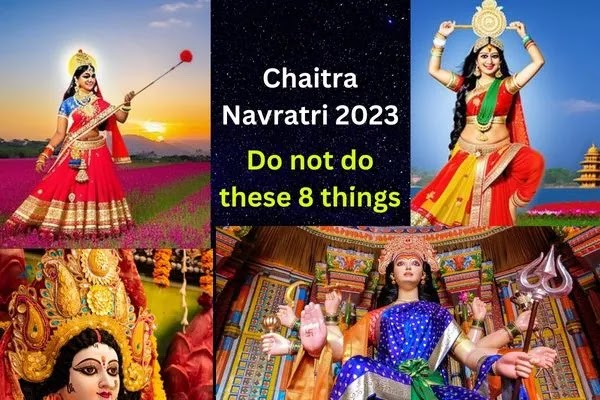Chaitra Navratri 2023: Do not do these 8 things
Chaitra Navratri 2023: According to the Hindu calendar, the Hindu New Year starts every year with Chaitra Navratri. Throughout the year, four Navratris are celebrated, consisting of two secret Navratris and two visible Navratris. The 9 forms of Maa Durga are worshiped on the Navratri coming in the month of Chaitra and Ashwin, whereas in the Gupta Navratri of Ashadh and Magha, 10 Mahavidyas of Maa Durga are worshipped.
The purpose of the Navratri festival is to worship Maa Durga and her nine avatars, known as Navadurga. Navratri means 'nine nights' in Sanskrit. Hindus celebrate a total of 4 Navratris throughout the year.
Chaitra Navratri and Sharadiya Navratri, being in sync with the commencement of seasons, are the two Navratris that witness elaborate festivities. These two occasions, celebrated during the onset of spring and autumn, respectively, are marked with grandeur and enthusiasm. The significance of these Navratris aligns with the rejuvenation of nature, prompting widespread celebrations, rituals, and joyful gatherings
Chaitra Navratri is starting from 22 March 2023. Navami date is on 30 March 2023. On March 31, 2023, the fast will be celebrated on Dashami.
Chaitra Navratri has special significance in Hinduism because worship performed during Chaitra Navratri strengthens people spiritually. The spiritual desires of these people have been fulfilled. It is said that on the day of Chaitra Navratri celebrated in the month of March-April, the person who worships Maa Durga with a true heart gets the desired fruit. That's why Chaitra Navratri has special importance.
Must avoid these 8 things during Navratri -
don't sleep on the bed
It is believed that any luxuries should be kept to a minimum while fasting. Since Navratri is a holy festival of fasting and prayer, people are advised to sleep on the floor (Bhumi Shayan). Sleeping on the floor also keeps us connected to Mother Earth and encourages humility. Also, sleeping on the floor strengthens our bones and reduces the problem of back pain.
Any kind of argument or violence
According to popular belief, festivals are occasions when gods and goddesses visit our homes. It is always understood that peace should flourish these days so that God can bless us with happiness, good luck and health. Any type of argument, quarrel or violence should be avoided during Navratri. Avoiding arguments can prevent feelings of anger and hate. It encourages us to be resilient and live with dignity
Leaving home empty
Many people perform Navratri Puja by fasting for the whole nine days and lighting unbroken lamps. If the Akhand Jyoti has been lit then one should stay at home. Akhand Jyoti is lit to express devotion to Maa Durga and someone needs to take care of it for the whole nine days for the continuous lighting of the Jyoti. Leaving Jyoti alone in the house is considered an insult to the Goddess. The eternal flame symbolizes the victory of good over evil. As the lamp burns and illuminates even the darkest places, we should never lose hope in our bad times. This observance of Akhand Jyoti teaches the devotees hope and perseverance
Celibacy
It is essential to remain celibate and avoid physical relations while following the Navratri Puja rituals. By doing this your focus remains focused and you get power over your senses and organs. With no distractions or effort, our energy levels soar and we are at our best. It leads us to the path of wisdom and inculcates wisdom and patience in us
Eat meat & Drink Water
Non-vegetarian food and any kind of rich food is strictly avoided by the devotees during the nine days of Navratri. While eating non-vegetarian food is considered a sin as it involves sacrificing an organism, food like garlic, onion, processed food etc. are also avoided as they are not a part of sattvic diet. , A sattvic diet helps detox the body and improve our focus through better digestion and metabolism. Also, since Navratri means seasonal change, foods like onion and garlic can heat up the body, which can make us sick.
shaving, cutting hair and nails
The fasting devotees also refrain from cutting hair and nails during Navratri. It was believed that these activities are done to maintain their beauty and hence detract from the purpose of Navratri Puja.
The practical implication of this rule is that wounds from shaving can take a long time to heal because Navratri starts with high humidity at the end of the monsoon
Shouting or Talking too much
Devotees, especially women, are known to observe Maun Vrat (or Maun Vrat) during Navratri. It is a way of expressing devotion to Maa Durga and in honor of her valor and strength in defeating the demon king Mahishasura. Silent fasting along with Dhyana (meditation) helps in improving our awareness. It also gives us control over our mind and speech, and helps us achieve inner peace, making us more aware.
Eating before donation
Every ritual is completed by giving donations and gifts to the less fortunate. Kanya Pujan (worship of little girls) is also observed during Ashtami or Navami of Navratri, where nine girls are invited by devotees to their homes and are offered food and gifts. People eat only after donation as they believe that they need to serve Mother Goddess first through these donation .
Q: What is Chaitra Navratri?
Q: What is the significance of Chaitra Navratri?
Q: How is Chaitra Navratri celebrated?
Q: What are some of the customs and traditions associated with Chaitra Navratri? A: Some of the customs and traditions associated with Chaitra Navratri include fasting, performing puja, lighting diyas, decorating the house with flowers, and reciting mantras.
Q: Are there any special dishes or foods prepared during Chaitra Navratri?
Q: Is Chaitra Navratri a national holiday in India?
Q: Can non-Hindus participate in Chaitra Navratri celebrations?


Post a Comment
Please write reasonable and relevant comment